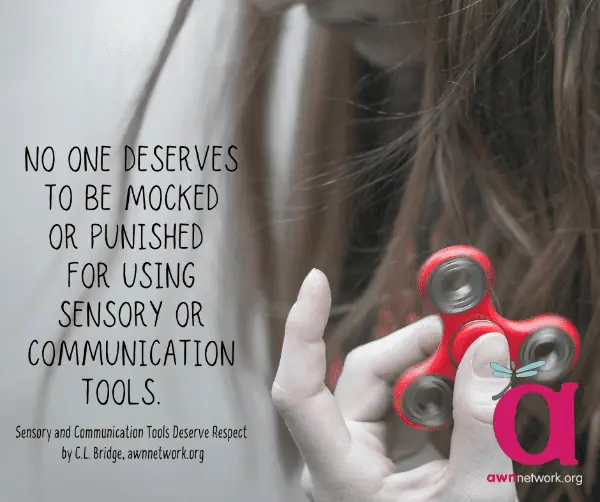
Sensory and Communication Tools Deserve Respect
I work at a public library. One night I was scanning papers for a woman whose daughter looked about nine or ten years old. The girl quietly chewed a plastic choker and fidgeted in place with her hands and feet. She wasn’t disruptive at all, but her mother’s reaction to her stimming certainly was. Despite the girl clearly stating “I need something to chew on” and “I need to move around”, the woman slapped her, called her necklace-chewing “nasty” and her fidgeting “foolish”, and forced her into a chair.
I handed back the scanned papers, hiding intense anger and thinking of all the things I wanted to say. When the woman wasn’t looking, I slipped the kid a smile. It was the least I could do.
This parent’s treatment of her possibly-neurodivergent child was excruciating to watch. I will never forget that night.
Stigma and shame around neurodivergent needs can take many forms, some of which can appear much more “benevolent” than the public shaming I witnessed at the library. I have heard of parents denying chewy necklaces or other stim tools to children and teens with diagnosed sensory needs because they “might stand out” or “might get teased”. This may seem kinder than slapping and insulting a child, but it too can cause them to feel deeply ashamed.
The belief that sensory aids are shameful or childish even appears in children’s books. The library recently acquired a middle grade novel about a girl with hyperacusis. The author does not have firsthand experience with auditory sensitivity… and it shows. Very few “trusted” adults in the book respect the girl’s sensitive hearing or treat it as a genuine disability. Her therapist compares her noise-canceling headphones to a security blanket and wants her to stop using them, “cold turkey”… because other kids are teasing her and she isn’t making friends. Even worse, he really frowns on her for using earmuffs to ease the transition, and he and her mother force her into music lessons to get used to noise. She befriends one of the loudest children in school. This child’s noisy behavior is seen as a difference to accept, while the protagonist’s disability is not. Kids with sensitive hearing deserve more respect than this, in books and in life.
Communication tools used by autistic people deserve more respect too. I recently made the mistake of reading (and engaging with) the comments on an Instagram photo of color-coded interaction lanyards. There were so many comments saying that the lanyards were childish or silly, and that there must be something “wrong” with any adult who needs them. A middle-aged man called the lanyards unprofessional, and a college guy said they were “the dumbest thing he’d ever seen”. Even after being informed that color-coded communication badges were invented by and for the autistic community, both of these commenters doubled down on their views. They insisted that in a workplace without autistic people, using such lanyards would be ridiculous. Neither of them considered that there are undisclosed and undiagnosed autistic people working all around them.
Neurotypicals, please be better than this. No one deserves to be mocked or punished for using sensory or communication tools. Stim toys, noise-canceling headphones, or other tools should never be withheld from a child or adult just because other people might ridicule them for it. Instead, let’s hold society accountable for ableism.
